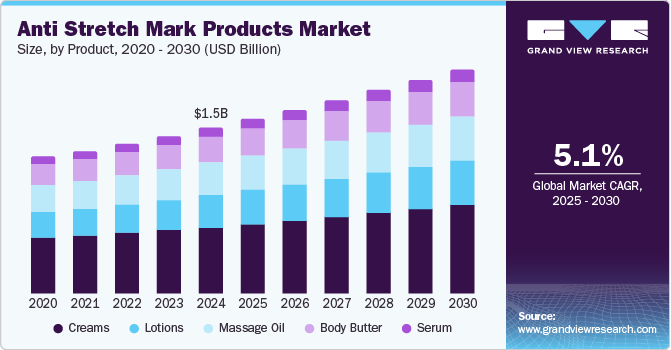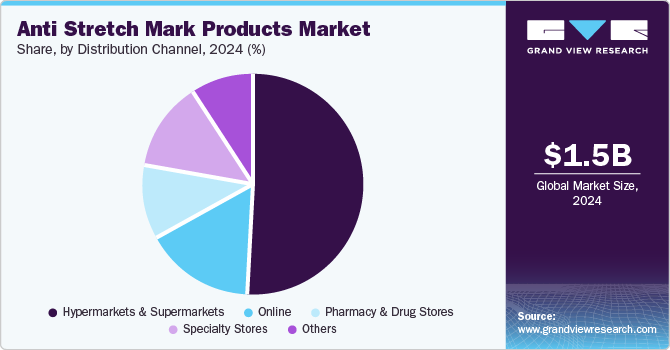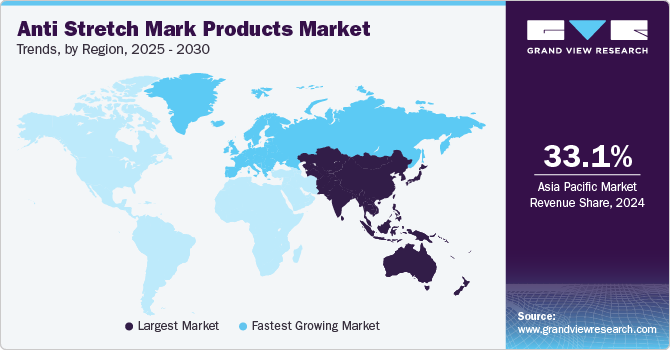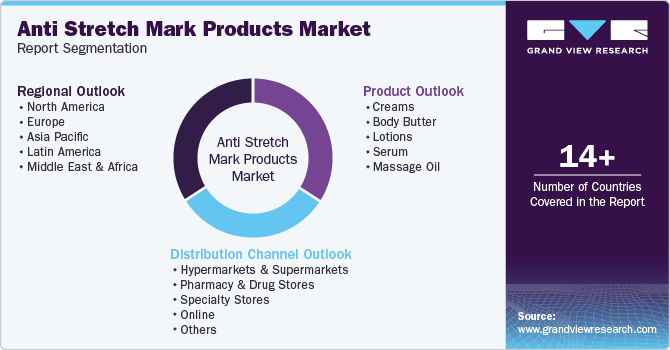- Home
- »
- Beauty & Personal Care
- »
-
Anti Stretch Mark Products Market, Industry Report, 2030GVR Report cover
![Anti Stretch Mark Products Market Size, Share & Trends Report]()
Anti Stretch Mark Products Market (2025 - 2030) Size, Share & Trends Analysis Report By Product (Creams, Body Butter, Lotions, Serum, Massage Oil), By Distribution Channel (Specialty Stores, Online), By Region, And Segment Forecasts
- Report ID: GVR-4-68039-663-5
- Number of Report Pages: 80
- Format: PDF
- Historical Range: 2018 - 2023
- Forecast Period: 2025 - 2030
- Industry: Consumer Goods
- Report Summary
- Table of Contents
- Interactive Charts
- Methodology
- Download FREE Sample
-
Download Sample Report
Anti Stretch Mark Products Market Summary
The global anti stretch mark products market size was valued at USD 1.45 billion in 2024 and is projected to reach USD 1.95 billion by 2030, growing at a CAGR of 5.1% from 2025 to 2030. Increasing awareness about skin health and the rising prevalence of stretch marks due to factors such as pregnancy, weight fluctuations, and adolescence are significant drivers.
Key Market Trends & Insights
- Asia Pacific anti-stretch mark products industry dominated the global market with the largest revenue share of 33.1% in 2024.
- Europe's anti-stretch mark products industry is expected to grow at a significant CAGR of 5.0% over the forecast period.
- Based on product, creams dominated the market with the largest revenue share of 37.3% in 2024.
- In terms of distribution channel, hypermarkets and supermarkets dominated the market with the largest revenue share in 2024.
Market Size & Forecast
- 2024 Market Size: USD 1.45 Billion
- 2030 Projected Market Size: USD 1.95 Billion
- CAGR (2025-2030): 5.1%
- Asia Pacific: Largest market in 2024
The growing demand for effective skincare solutions to reduce the appearance of stretch marks has led to a surge in the consumption of anti-stretch mark products. Additionally, expanding product offerings and product formulation advancements, including natural and organic ingredients, contribute to market growth. The influence of social media and beauty trends also plays a crucial role, as more consumers become aware of the benefits of anti-stretch mark products and seek to achieve flawless skin.
Consumers' increasing disposable income and willingness to spend on premium skincare products contribute significantly to market expansion. The rise of online retail channels and e-commerce platforms has made anti-stretch mark products more accessible to a broader audience, further boosting sales. The growing trend of self-care and wellness, coupled with the influence of beauty and skincare influencers, encourages consumers to incorporate specialized products into their skincare routines. Additionally, advancements in dermatological research and the development of innovative formulations, such as those containing vitamins, essential oils, and botanical extracts, enhance the efficacy and appeal of anti-stretch mark products. The aging population and the desire to maintain youthful skin also drive the demand for these products.
Additionally, the rise in the consumption of calorie-laden fast food by a large population can cause stretch blemishes, thereby driving the demand for such products. Conventionally, anti-stretch skincare products were mostly available in the form of cream and lotion. However, nowadays, many brands offer these products in various forms, including body butter, serum, and massage oil.
Product Insights
Creams dominated the market with the largest revenue share of 37.3% in 2024. The segment growth is driven by the widespread preference for cream-based formulations among consumers due to their ease of application, effective moisturizing properties, and ability to penetrate deeply into the skin. Creams often contain active ingredients such as vitamins, essential oils, and botanical extracts that help nourish the skin and improve its elasticity, thereby reducing the appearance of stretch marks. The availability of various creams tailored for different skin types and specific needs further enhances their appeal. Additionally, the influence of dermatologists and skincare professionals recommending cream-based products for stretch mark prevention and treatment contributes to the high revenue share of this segment.
Serum is expected to grow at the fastest CAGR of 5.5% over the forecast period. Serums are increasingly popular among consumers due to their lightweight formulation, quick absorption, and high concentration of active ingredients, which enhance their effectiveness in reducing the appearance of stretch marks. Using innovative ingredients such as peptides, hyaluronic acid, and various botanical extracts in serums helps improve skin elasticity and texture, making them a preferred choice for many. Additionally, the rising trend of personalized skincare and the demand for targeted treatments contribute to the growth of the serum segment. The influence of dermatologists and skincare experts, who often recommend serums for their potent benefits, further supports their popularity.
Distribution Channel Insights
Hypermarkets and supermarkets dominated the market with the largest revenue share in 2024. They offer a wide variety of anti-stretch mark products from numerous brands, providing consumers with ample choice and convenience. The ability to physically examine and compare products before purchasing enhances customer satisfaction and trust. Additionally, these retail channels often offer competitive pricing and promotions, making them an attractive option for consumers. The extensive reach and accessibility of hypermarkets and supermarkets, particularly in urban and suburban areas, contribute to their significant market presence.

Specialty store is expected to grow at the fastest CAGR over the forecast period. Specialty stores provide a curated selection of products, often focusing on high-quality and niche brands that cater to specific skincare needs, such as anti-stretch mark treatments. The personalized shopping experience and expert advice at specialty stores attract consumers seeking tailored skincare solutions. Additionally, these stores frequently offer exclusive products and formulations that are not readily available in mainstream retail channels. The increasing trend of consumers seeking specialized and effective skincare treatments further supports the growth of specialty stores.
Regional Insights
Asia Pacific anti-stretch mark products industry dominated the global market with the largest revenue share of 33.1% in 2024. The region's large and diverse population, rising disposable incomes, and increasing awareness of skincare contribute to the high demand for anti-stretch mark products. Additionally, the growing influence of beauty and wellness trends, particularly in countries like China, Japan, and South Korea, fuels the market expansion. The presence of numerous local and international skincare brands offering a wide range of products further supports the market's growth. The increasing emphasis on personal grooming and the rising popularity of natural and organic skincare products also play a crucial role.

North America Anti Stretch Mark Products Market Trends
North America anti stretch mark products market held a considerable share in 2024 owing to the high consumer awareness of skincare and the increasing prevalence of stretch marks due to lifestyle factors like pregnancy, weight fluctuations, and fitness activities. The U.S. and Canada's robust healthcare and beauty sectors support the demand for advanced and effective anti-stretch mark products. The influence of social media and beauty trends also encourages consumers to invest in specialized skincare solutions. The presence of leading skincare brands and the availability of innovative product formulations also contribute to the substantial market share of the North America anti-stretch mark products industry.
The U.S. anti-stretch mark products market is expected to grow significantly over the forecast period. The country’s growth is attributed to high consumer awareness and a strong focus on personal wellness and beauty. The prevalence of stretch marks due to lifestyle factors such as pregnancy, weight fluctuations, and fitness activities drives the demand for effective treatments. The U.S. market benefits from a robust healthcare and beauty industry, with numerous leading brands offering innovative and specialized products to cater to diverse consumer needs. The influence of social media and beauty trends plays a significant role, encouraging consumers to seek out targeted solutions for stretch mark prevention and reduction. Additionally, the availability of advanced formulations and the presence of dermatologists and skin care professionals who recommend these products contribute to the market's growth. The U.S. market is characterized by a wide range of product offerings, including creams, serums, oils, and lotions, designed to meet the specific needs of different skin types and conditions.
Europe Anti Stretch Mark Products Market Trends
Europe's anti-stretch mark products industry is expected to grow at a significant CAGR of 5.0% over the forecast period. The region's strong tradition of beauty and wellness, coupled with the influence of fashion and cosmetic trends, fuels the demand for high-quality anti-stretch mark products. European consumers are increasingly seeking out products that contain natural and organic ingredients, reflecting the growing trend towards sustainable and ethical skincare. The market benefits from the presence of well-established skincare brands and a high level of innovation in product formulations. Additionally, the integration of advanced technologies and dermatological research enhances the efficacy of these products, making them more appealing to consumers. The diverse demographic profile and the varying needs of consumers across different countries in Europe contribute to the market's dynamic growth.
Key Anti Stretch Mark Products Company Insights
Some key companies in the anti-stretch mark products market include L’Oréal S.A., Beiersdorf AG, Mustela, Bio Oil, Clarins, and others.
-
Mustela is a renowned French brand specializing in skincare products for babies and mothers. The anti-stretch mark products are particularly popular among pregnant women. Mustela's Stretch Marks Cream and Stretch Marks Serum are formulated with maracuja oil (passion fruit oil), which is known for its moisturizing properties and ability to improve skin elasticity.
-
Bio-Oil is a well-known skincare oil brand that offers a range of products aimed at improving the appearance of stretch marks, scars, and uneven skin tone. The Original Face & Body Oil is a popular choice for stretch mark prevention and reduction. The oil contains a unique blend of vitamins (A and E), minerals, and plant extracts, including lavender oil and chamomile oil.
Key Anti Stretch Mark Products Companies:
The following are the leading companies in the anti stretch mark products market. These companies collectively hold the largest market share and dictate industry trends.
- L’Oréal S.A.
- Beiersdorf AG
- Mustela
- Bio Oil
- Clarins
- The Clorox Company
- The Estée Lauder Companies Inc.
- Himalaya Global Holdings Ltd.
- Crown
- The Natural Baby Company
Recent Developments
-
In November 2024, LipoTrue unveiled two innovative cosmetic ingredients, Lightmony and Deepstrine, at In-Cosmetics Asia. Lightmony, inspired by the Korean “glass skin” trend, combines pomegranate and lemon extracts to enhance skin radiance, reduce dark spots, and improve texture. Meanwhile, Deepstrine, a marine ferment derived from the North Atlantic, targets stretch marks, restoring skin resilience and hydration.
-
In May 2024, a renowned beauty brand popularized by Kim Kardashian announced a site-wide sale during its May Frenzy Sale. The highlight of the promotion is the Anti-Cellulite and Stretch Mark Lotion, typically priced at USD 24.99, which exceeded 100,000 sales following a reformulation. This lightweight lotion, enriched with botanical extracts and natural oils, aims to enhance skin elasticity and hydration for up to 72 hours.
Anti Stretch Mark Products Market Report Scope
Report Attribute
Details
Market size value in 2025
USD 1.52 billion
Revenue forecast in 2030
USD 1.95 billion
Growth Rate
CAGR of 5.1% from 2025 to 2030
Base year for estimation
2024
Historical data
2018 - 2023
Forecast period
2025 - 2030
Quantitative units
Revenue in USD million/billion and CAGR from 2025 to 2030
Report coverage
Revenue forecast, company ranking, competitive landscape, growth factors, and trends
Segments covered
Product, distribution channel, region
Regional scope
North America; Europe; Asia Pacific; Latin America; MEA
Country scope
U.S., Canada, Mexico, Germany, UK, France, Italy, Spain, China, Japan, India, Australia, South Korea, Argentina, South Africa, and Turkey
Key companies profiled
L’Oréal S.A.; Beiersdorf AG; Mustela; Bio Oil; Clarins; The Clorox Company; The Estée Lauder Companies Inc.; Himalaya Global Holdings Ltd.; Crown
Customization scope
Free report customization (equivalent up to 8 analysts working days) with purchase. Addition or alteration to country, regional & segment scope.
Pricing and purchase options
Avail customized purchase options to meet your exact research needs. Explore purchase options
Global Anti Stretch Mark Products Market Report Segmentation
This report forecasts revenue growth at global, regional, and country levels and provides an analysis of the latest industry trends in each of the sub-segments from 2018 to 2030. For this study, Grand View Research has segmented the global anti stretch mark products market report based on product, distribution channel, and region:

-
Product Outlook (Revenue, USD Million, 2018 - 2030)
-
Creams
-
Body Butter
-
Lotions
-
Serum
-
Massage Oil
-
-
Distribution Channel Outlook (Revenue, USD Million, 2018 - 2030)
-
Hypermarkets & Supermarkets
-
Pharmacy & Drug Stores
-
Specialty Stores
-
Online
-
Others
-
-
Regional Outlook (Revenue, USD Million, 2018 - 2030)
-
North America
-
U.S.
-
Canada
-
Mexico
-
-
Europe
-
UK
-
Germany
-
France
-
Italy
-
Spain
-
-
Asia Pacific
-
Japan
-
China
-
India
-
Australia & New Zealand
-
South Korea
-
-
Latin America
-
Brazil
-
-
Middle East and Africa (MEA)
-
South Africa
-
-
Share this report with your colleague or friend.
Need a Tailored Report?
Customize this report to your needs — add regions, segments, or data points, with 20% free customization.

ISO 9001:2015 & 27001:2022 Certified
We are GDPR and CCPA compliant! Your transaction & personal information is safe and secure. For more details, please read our privacy policy.
Trusted market insights - try a free sample
See how our reports are structured and why industry leaders rely on Grand View Research. Get a free sample or ask us to tailor this report to your needs.










